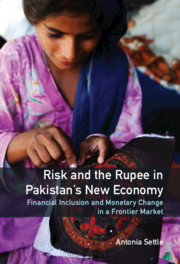 Risk and the Rupee in Pakistan's New Economy
Risk and the Rupee in Pakistan's New Economy Published online by Cambridge University Press: 31 March 2020
The sharp deterioration in monetary indicators in 2008 posed significant challenges for the SBP's management of the rupee. The SBP was forced to draw down reserves as the exchange rate depreciated sharply, fed by deterioration in the current account, sharp reversals in the capital account, and formidable speculative activity in foreign exchange markets. The high commodity prices that exacerbated the current account gap also pushed up inflation, which spiked at 25 per cent in August. These conditions characterised what has been termed Pakistan's own home-grown crisis of 2008 (ul Haque 2010).
These conditions were, however, far from monetarily catastrophic. Inflation did not come close to the classic definition of hyperinflation, which is defined as rises in prices of over 50 per cent per month (Cagan 1956). In fact, with ‘safe’ levels of inflation estimated at around a 10 or 12 per cent threshold for developing economies (in contrast to 2 or 3 per cent for advanced economies), double digit inflation in Pakistan is not in itself necessarily an economic problem. By early 2014, predictions of a firm recovery were materialising with stabilisation in the external payments position, appreciation in the rupee and considerable growth in reserves.
Yet this study identifies monetary practices amongst ordinary people that are characteristic of hyperinflation. The drop in deposits, the shift into ‘in kind’ stores of value and the expanded use of non-rupee units of account present monetary strategies that are fiercely discordant with the picture painted by monetary statistics. This opens up a set of questions about both the rupee’s governability under open markets and about the scope of the rupee's contestation amongst the local population. Taking these points together poses the possibility that in Pakistan's new economy, financial inclusion is being rejected by ordinary, generally poor households at the same time as its potential benefits for monetary governability are being increasingly recognised at the central bank. Might the push for financial inclusion in Pakistan be playing out more as a project to shore up the rupee than an attempt to bring poor households out of poverty?
New Money Practices in Pakistan
The discussion in Chapters 5 and 6 suggests that a series of money practices which counter risk attached to the liberalised rupee have become popular in the postliberalisation years.
To save this book to your Kindle, first ensure no-reply@cambridge.org is added to your Approved Personal Document E-mail List under your Personal Document Settings on the Manage Your Content and Devices page of your Amazon account. Then enter the ‘name’ part of your Kindle email address below. Find out more about saving to your Kindle.
Note you can select to save to either the @free.kindle.com or @kindle.com variations. ‘@free.kindle.com’ emails are free but can only be saved to your device when it is connected to wi-fi. ‘@kindle.com’ emails can be delivered even when you are not connected to wi-fi, but note that service fees apply.
Find out more about the Kindle Personal Document Service.
To save content items to your account, please confirm that you agree to abide by our usage policies. If this is the first time you use this feature, you will be asked to authorise Cambridge Core to connect with your account. Find out more about saving content to Dropbox.
To save content items to your account, please confirm that you agree to abide by our usage policies. If this is the first time you use this feature, you will be asked to authorise Cambridge Core to connect with your account. Find out more about saving content to Google Drive.